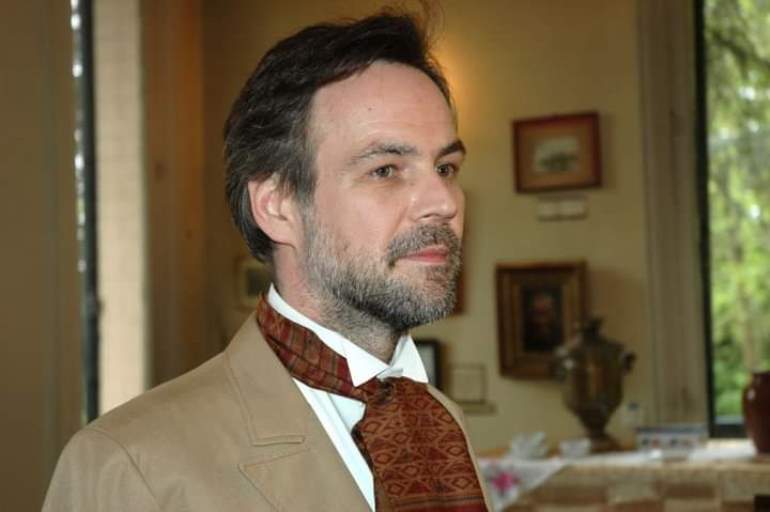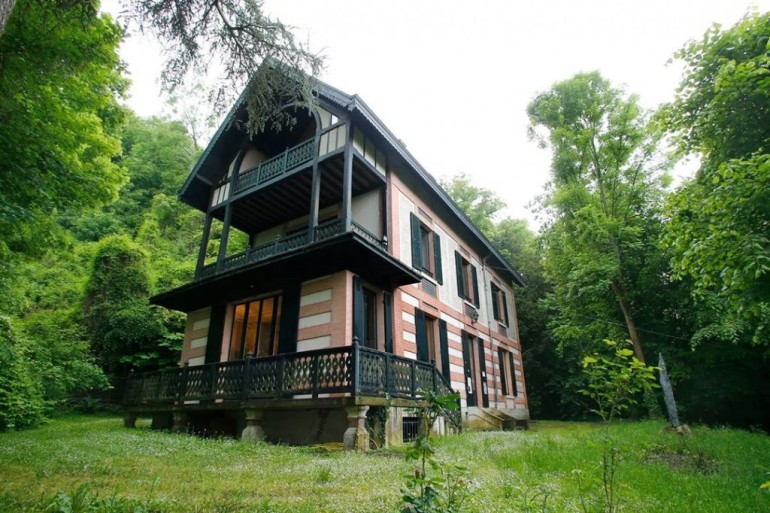Sergey Vinogradov
35 years ago “Yaseni”, the House-Museum of Ivan Turgenev, was opened in the community of Bougival near Paris. The year of the writer’s 200th birthday anniversary has become the most eventful one in the Yaseni Museum history; thousands of compatriots and France residents have visited exhibitions and performances conducted here. According to Marc Zvigilskiy, the Museum Director, whose father founded the museum in the estate where Turgenev spent eight last years of his life, the anniversary celebrations in Bougival enabled the French to discover the Russian classic writer anew.
Marc Zvigilskiy told the Russkiy Mir of how the anniversary year in the Turgenev Museum had been, and if contemporary French people knew about Turgenev, as well as which of his works were the most valued ones.
The man of global mind
– In November the grand guest night was conducted in the Turgenev Museum to commemorate the writer’s 200th birthday anniversary. Have all events in the Bougival agenda been completed?
– Yes, the overall agenda has been completed. The last events were conducted on November 9 and 10. We welcomed groups of visitors from Germany, Belgium and Russia. They were the people of various nationalities who love Russia and its culture. The Turgenev’s year will culminate in screening of “Mumu”, the Russian animated film translated into French. On December 10 the special screening will be performed for children of Bougival; and I believe they will be deeply touched by the story.
In the House Museum of Ivan Turgenev in Bougival
– How has the anniversary year been experienced in the Museum?
– In a very positive and intense way. We conducted many events dedicated to Turgenev. Our Yaseni Museum hosted exhibitions centered around Turgenev’s life in France, as well as other pages of his biography. There were concerts, meetings and reading events. It is gratifying to mention that Bougival also took an active part in these celebrations. The local theater hosted performances and concerts based on Turgenev’s works and narrated about the writer. The community conducted screening of movies produced based on his novels and short stories. That is to say – Ivan Turgenev’s birthday anniversary was widely celebrated and has turned into genuinely global event.
I would like to highlight big conferences in Sorbonne and UNESCO Headquarters where Turgenev was named the man of global mind.
– You cooperate with other museums. Which cities and countries are they from?
– First of all, I would like to mention our friends from Moscow – the Turgenev Museum and Turgenev’s Library; we also have good collaboration with the Turgenevian community in Baden-Baden. Two years ago we visited them together with our Mayor to discuss preparation for Turgenev’s 200th birthday anniversary. And not long ago we were able to go there and take part in the anniversary celebrations.
– Which of Turgenev’s works are the most well-known and loved in France?
– Obviously, it is First love. The novel is the most well-known and popular work by Turgenev in France. There are no any rivals. I would allocate the second and the third places to Fathers and Sons and Sketches from a Hunter’s Album respectively. I remember when studying in the 4th grade of French school, our history teacher recommended pupils to read Sketches from a Hunter’s Album and praised it. I was glad and impressed.
“I wanted to name my son Ivan”
– Who attends your events – Russian compatriots or French people?
– Both. The Russians have been always visiting us ever since the Museum was opened in 1983. Representatives of Russian émigré communities, especially those who came to France long time ago, are very happy that there is the Russian writer’s museum near Paris. They had been waiting for it for a long time. But our exhibitions and concerts are extensively attended by French audience. Most often we have visitors from Paris and its neighborhood. But residents of Bougival have been also showing interest in the Museum located in their community, as well as Turgenev himself. The anniversary celebrations were very helpful in this respect. I was told in the local theater that audience obviously preferred comedies, but the house was never empty when Turgenev’s plays were on the stage.
Marc Zvigilskiy
– Is it possible to say that the anniversary year helped the French to know Turgenev better?
– Surely it is. However the anniversary year was not the only reason for it to happen. This year the Bougival Town Hall has got the grant for restoration of Pauline Viardot’s villa located next to Turgenev’s house. He bought his Yaseni Estate so he could live next to his beloved woman. So some big newspapers published information about future restoration of Viardot’s villa; the story was covered by TV channels and told on Radio. And obviously they mentioned Ivan Turgenev. This restoration story turned to be a good promotion campaign for our museum and Ivan Turgenev.
There was another story as well. The house of Georges Bizet, a composer, is also located in Bougival; recently it was bought out by the town. It was also widely discussed in French mass meda. Lots of people found out that there is such place as Bougival, and there are so many interesting things in it.
– Have any buildings and streets seen by Turgenev survived in Bougival?
– Fortunately they have. Here is the Lageren’s house where Turgenev and Viardot lived for two years until they bought their houses. It is located not far from Yaseni. Though the house is private, sometimes, on special occasions, its owner opens it for visitors who love Turgenev. Besides he gave permission to install the memorial plaque on his house.
– Once, visiting Moscow, you told me about idea to make a film about Turgenev within the Museum’s entourage. Has this project gained momentum?
– Unfortunately, not yet. The project is not an easy one, especially in financial terms. It is non profitable, so its implementation is complicated. I introduced the project and offered participation in it to various persons; everyone said that it was interesting; however it would not be able to attract general public at large. I changed the story, did my best to make it more dramatic; nothing helped. I really wanted the film to be completed by the anniversary, but it did not happen. Then my son was born; so the film had to be postponed.
Later on I was able to discuss the project with Vera Glagoleva, a Russian film director; we even started working together. But last year she passed away.
The concept was centered around Turgenev’s daughter, Pelageya; it could turn into a very interesting film. We wanted to unveil facts which are not well known in Russia and even more so in France. Dramatic relationship of Turgenev with Dostoevsky and Leo Tolstoy is also a very interesting topic for me, which could make a wonderful story for a movie. In other words, I haven’t abandoned the idea to produce a film about Ivan Turgenev.
– You did not name your son Ivan, did you?
– (laughing) No, his name is Alyosha. Though we had such thought and really wanted to do it, but finally decided otherwise.
Macron and Plácido Domingo visiting Turgenev.
– Last autumn Emmanuel Macron, the President of France, came to Bougival. Was his visit related to Viardot’s villa?
– Yes, it surely was. Those were the days dedicated to old buildings and structures, historical monuments of France. Macron came with his wife and the minister of culture. They looked around the Viardot’s villa and saw Turgenev’s house. Unfortunately he did not come inside. The president was faced by journalists, which were not interested in culture and monuments in Bougival. They asked about politics and other topics. Though, obviously, it is a rather positive fact that the president came and showed his support for restoration of the Viardot’s villa. It is rather beneficial for the Turgenev Museum as well.
Dacha (house) of Ivan Turgenev in Bougival. Photo credit:: tourisme-bougival.com
– After being restored, what institution will the Viardo’s villa be handed over to?
– This is a very complicated question. The reason is because the Viardot’s villa, Yaseni and the adjacent park belong to the town of La Celle-Saint-Cloud. This year they have finally signed the agreement with Bougival for fifty years. A decision on what shall be opened in the Viardo’s villa and who will be in charge of it has not been taken yet. My father wished to open there a cultural center dedicated to the 19th century. However it may happen that it will be occupied by a musical school under the European Center of Music. This large-scale organization cooperates with many renowned cultural figures; for example, Plácido Domingo visited Bougival last year.
We are ready to collaborate with them and implement joint projects, not least because of strong love Turgenev had for music; he considered it to be the primary art. From our side we suggested to the Bougival Town Hall a project aimed to development and possible extension of our library. We have a unique library with books in various languages – about Turgenev, culture and art. However, there are no visitors, because people do not know about it.
– Around ten years ago your father, Alexander Zvigilskiy, the founder of the Turgenev Museum, set all the bells a-ringing, because local authorities had intention to sell Turgenev’s house and Viardo’s villa to hotel industry or demolish them. The Russian Government also took part in resolving the issue at that time. Does the threat still exist?
– No, it does not; the issue is not relevant anymore. The processes surrounding the Turgenev Museum have been set in the right direction. And I can state that the Museum will be intact.









